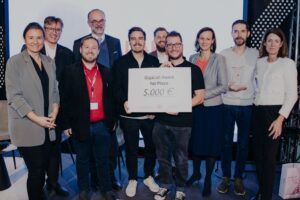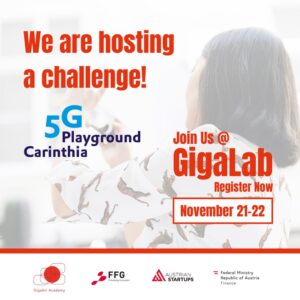
Am 21. und 22. November ging das GigaLab der FFG in Wien über die Bühne.
Das GigaLab wurde als Hackathon konzipiert, um gemeinsam Ideen für digitale Herausforderungen zu entwickeln, die durch eine gigabitfähige oder auf 5G basierende Anwendung gelöst werden könnten.
Der 5G Playground Carinthia hat eine spannende Challenge durch das Team der FH Kärnten eingereicht. Das Thema: „Wie könnten wir ein ortsbezogenes kooperatives Multiplayer-Spiel mit Indoor- und Outdoor-Komponenten/Spielern entwickeln, indem wir Streaming mit niedriger Latenzzeit in Kombination mit modernen Telekommunikationsnetzen und lokaler Datenverarbeitung nutzen?“
Das Interesse an der Challenge war groß, daher wurden sogar zwei Gruppen gebildet. Die kreativen Köpfe tüftelten zwei Tage intensiv daran, wie große Events wie Konzerte mit Anwendungen von 5G, Drohnen und der Edge-Cloud effizient und friktionsfrei abgewickelt werden können.
Die Arbeit überzeugte auch die Fachjury, bestehend aus Henrietta Egerth (FFG Geschäftsführerin), Mariana Kühnel (Generalsekretär-Stellvertreterin WKÖ), Birgit Horeiter (Director i2c @ TU Wien) und Andreas Reichhardt (Sektionschef im Finanzministerium).
Dass die GigaLab Explorer einen hervorragenden Pitch ablieferten, beweist das Ergebnis: Die GigaLab Explorer haben für diese Challenge den ersten Platz gewonnen!
Wir gratulieren allen Beteiligten sehr herzlich zu dieser großartigen Leistung!
Ein besonderer Dank gilt an dieser Stelle dem Team rund um Prof. Helmut Wöllik von der Fachhochschule Kärnten, die diese Challenge entwickelt und betreut haben.
Einmal mehr konnte bewiesen werden, dass am 5G Playground Carinthia exzellente Forschung betrieben wird, die auch österreichweit große Anerkennung findet!
Nähere Informationen dazu gibt es in der Presseaussendung: Spitzenplatz beim GigaLab-Hackathon der FFG | Fachhochschule Kärnten, 28.11.2023 (ots.at) oder auf der Seite der FH Kärnten.


Join us @ GigaLab of FFG
The idea lab where participants come together to develop solutions for gigabit & 5G applications!
The GigaLab is designed as an idea lab that brings people together to form teams that develop solutions for digital challenges. The focus is on challenges that may be solved with applications based on a gigabit-capable infrastructure and connectivity. Participants of the GigaLab will explore different ways of developing ideas inspired by our motto: “Driving digital innovation through gigabit connectivity“.
The GigaLab will take place on 21st an d22nd of November in Vienna (weXelerate, Praterstrasse 1, 1020 Vienna, Austria)
The 5G Playground is hosting a Challenge!
Title: Tele-operated strategy gaming
🎮 Ready to Level Up Gaming with 5G Playground? 📡
Join the revolution in location-based multiplayer gaming! Dive into our challenge at the GigaLab on Nov. 21-22!
💡 Challenge Your Skills: Craft a cooperative multiplayer game with indoor and outdoor components.
🌍 Explore New Realms: Utilize 5G and low-latency streaming for immersive gaming experiences.
🚀 Collaborate: Team up with fellow gamers and tech enthusiasts in the 5G Playground Challenge.
📢 Showcase Your Creation: Present your epic game at the “Future Forward Festival” on November 22nd.
💰 Win Big: Compete for up to € 5,000 and other thrilling prizes!
🥂 Play for Free: Enjoy complimentary access, including delicious food and drinks.
📅 Don’t miss out! Register now and choose the 5G Playground Challenge by November 14, 2023.
👉 Sign up here: https://gigabit-academy.b2match.io/
Let’s shape the future of gaming with 5G technology. Are you up for the challenge? 🎮📡 #5GPlayground #GigaLab #NextLevelGaming
Further description of the Challenge:
The research group would like to explore how a wide range of existing technologies can be used to develop a new kind of cooperative multiplayer game. This game isplayed by two teams, playing against each other. Each team consists of a number ofplayers that are fulfilling certain tasks on a real-life outdoor playing area (field-players) as well as one or more players in front of a computer, who are directing thefield-players (command-players). The teams compete over a set of pre-defined goals,which could be locating and securing certain items, extinguishing a simulated fire, orbuilding up pre-defined infrastructure. The hardware, that is necessary for such agame varies, but mostly consists of communication devices (5G network andmodems), positioning modules (e.g. GPS), ruggedized video equipment (e.g. 360°action cams), embedded devices (e.g. Jetson Nanos), and commercially availablecomputer and server infrastructure. Our research group has already implemented a communication framework with ultra-low latency which can be used forestablishing efficient communication channels between the field-players and thecommand-players. The goal is to define, how such a game could look like, how thecomponents and technologies work with each other, what the settings of the gamecould be, which video equipment should be used, and how this concept can beapplied in other fields (e.g. for aiding firefighters).
How might we create a location-based cooperative multiplayer game with both indoor and outdoor components/players by using low-latency streaming in combination with modern telecommunication networks and local processing of data?





